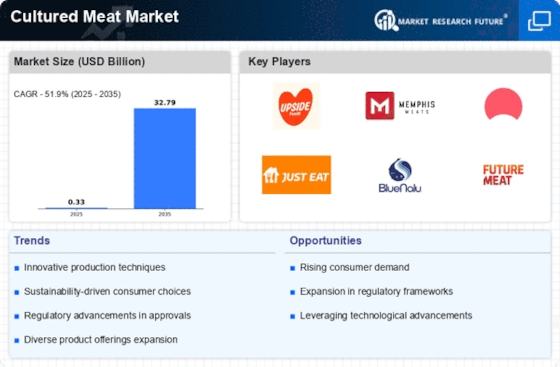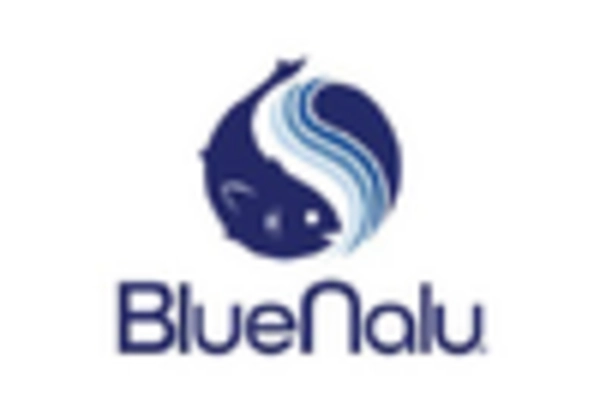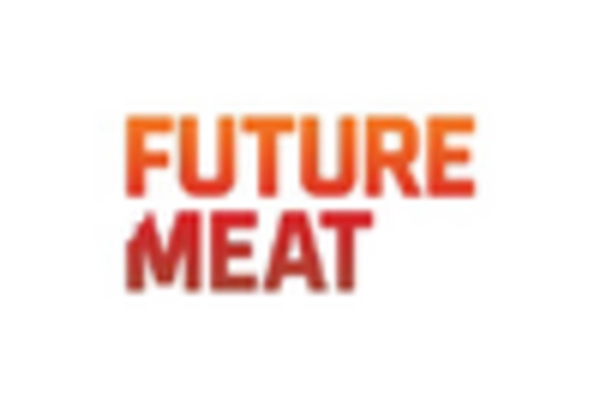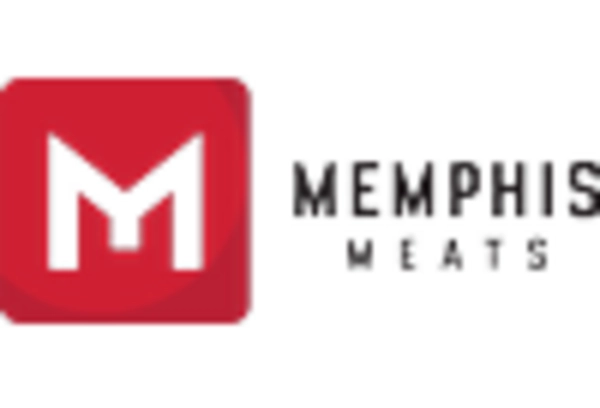Beef
Pork
Chicken
Fish
Other Poultry
Cellular Agriculture
Tissue Engineering
Fermentation-Based
Hybrid Approach
Food Products
Food Service
Research and Development
Culinary Innovations
Ground Meat
Whole Cuts
Processed Meat
Meat Snacks
North America
Europe
South America
Asia Pacific
Middle East and Africa
North America Outlook (USD Billion, 2019-2035)
North America Cultured Meat Market by Type
Beef
Pork
Chicken
Fish
Other Poultry
North America Cultured Meat Market by Production Method Type
Cellular Agriculture
Tissue Engineering
Fermentation-Based
Hybrid Approach
North America Cultured Meat Market by Application Type
Food Products
Food Service
Research and Development
Culinary Innovations
North America Cultured Meat Market by Form Type
Ground Meat
Whole Cuts
Processed Meat
Meat Snacks
North America Cultured Meat Market by Regional Type
US
Canada
US Outlook (USD Billion, 2019-2035)
US Cultured Meat Market by Type
Beef
Pork
Chicken
Fish
Other Poultry
US Cultured Meat Market by Production Method Type
Cellular Agriculture
Tissue Engineering
Fermentation-Based
Hybrid Approach
US Cultured Meat Market by Application Type
Food Products
Food Service
Research and Development
Culinary Innovations
US Cultured Meat Market by Form Type
Ground Meat
Whole Cuts
Processed Meat
Meat Snacks
CANADA Outlook (USD Billion, 2019-2035)
CANADA Cultured Meat Market by Type
Beef
Pork
Chicken
Fish
Other Poultry
CANADA Cultured Meat Market by Production Method Type
Cellular Agriculture
Tissue Engineering
Fermentation-Based
Hybrid Approach
CANADA Cultured Meat Market by Application Type
Food Products
Food Service
Research and Development
Culinary Innovations
CANADA Cultured Meat Market by Form Type
Ground Meat
Whole Cuts
Processed Meat
Meat Snacks
Europe Outlook (USD Billion, 2019-2035)
Europe Cultured Meat Market by Type
Beef
Pork
Chicken
Fish
Other Poultry
Europe Cultured Meat Market by Production Method Type
Cellular Agriculture
Tissue Engineering
Fermentation-Based
Hybrid Approach
Europe Cultured Meat Market by Application Type
Food Products
Food Service
Research and Development
Culinary Innovations
Europe Cultured Meat Market by Form Type
Ground Meat
Whole Cuts
Processed Meat
Meat Snacks
Europe Cultured Meat Market by Regional Type
Germany
UK
France
Russia
Italy
Spain
Rest of Europe
GERMANY Outlook (USD Billion, 2019-2035)
GERMANY Cultured Meat Market by Type
Beef
Pork
Chicken
Fish
Other Poultry
GERMANY Cultured Meat Market by Production Method Type
Cellular Agriculture
Tissue Engineering
Fermentation-Based
Hybrid Approach
GERMANY Cultured Meat Market by Application Type
Food Products
Food Service
Research and Development
Culinary Innovations
GERMANY Cultured Meat Market by Form Type
Ground Meat
Whole Cuts
Processed Meat
Meat Snacks
UK Outlook (USD Billion, 2019-2035)
UK Cultured Meat Market by Type
Beef
Pork
Chicken
Fish
Other Poultry
UK Cultured Meat Market by Production Method Type
Cellular Agriculture
Tissue Engineering
Fermentation-Based
Hybrid Approach
UK Cultured Meat Market by Application Type
Food Products
Food Service
Research and Development
Culinary Innovations
UK Cultured Meat Market by Form Type
Ground Meat
Whole Cuts
Processed Meat
Meat Snacks
FRANCE Outlook (USD Billion, 2019-2035)
FRANCE Cultured Meat Market by Type
Beef
Pork
Chicken
Fish
Other Poultry
FRANCE Cultured Meat Market by Production Method Type
Cellular Agriculture
Tissue Engineering
Fermentation-Based
Hybrid Approach
FRANCE Cultured Meat Market by Application Type
Food Products
Food Service
Research and Development
Culinary Innovations
FRANCE Cultured Meat Market by Form Type
Ground Meat
Whole Cuts
Processed Meat
Meat Snacks
RUSSIA Outlook (USD Billion, 2019-2035)
RUSSIA Cultured Meat Market by Type
Beef
Pork
Chicken
Fish
Other Poultry
RUSSIA Cultured Meat Market by Production Method Type
Cellular Agriculture
Tissue Engineering
Fermentation-Based
Hybrid Approach
RUSSIA Cultured Meat Market by Application Type
Food Products
Food Service
Research and Development
Culinary Innovations
RUSSIA Cultured Meat Market by Form Type
Ground Meat
Whole Cuts
Processed Meat
Meat Snacks
ITALY Outlook (USD Billion, 2019-2035)
ITALY Cultured Meat Market by Type
Beef
Pork
Chicken
Fish
Other Poultry
ITALY Cultured Meat Market by Production Method Type
Cellular Agriculture
Tissue Engineering
Fermentation-Based
Hybrid Approach
ITALY Cultured Meat Market by Application Type
Food Products
Food Service
Research and Development
Culinary Innovations
ITALY Cultured Meat Market by Form Type
Ground Meat
Whole Cuts
Processed Meat
Meat Snacks
SPAIN Outlook (USD Billion, 2019-2035)
SPAIN Cultured Meat Market by Type
Beef
Pork
Chicken
Fish
Other Poultry
SPAIN Cultured Meat Market by Production Method Type
Cellular Agriculture
Tissue Engineering
Fermentation-Based
Hybrid Approach
SPAIN Cultured Meat Market by Application Type
Food Products
Food Service
Research and Development
Culinary Innovations
SPAIN Cultured Meat Market by Form Type
Ground Meat
Whole Cuts
Processed Meat
Meat Snacks
REST OF EUROPE Outlook (USD Billion, 2019-2035)
REST OF EUROPE Cultured Meat Market by Type
Beef
Pork
Chicken
Fish
Other Poultry
REST OF EUROPE Cultured Meat Market by Production Method Type
Cellular Agriculture
Tissue Engineering
Fermentation-Based
Hybrid Approach
REST OF EUROPE Cultured Meat Market by Application Type
Food Products
Food Service
Research and Development
Culinary Innovations
REST OF EUROPE Cultured Meat Market by Form Type
Ground Meat
Whole Cuts
Processed Meat
Meat Snacks
APAC Outlook (USD Billion, 2019-2035)
APAC Cultured Meat Market by Type
Beef
Pork
Chicken
Fish
Other Poultry
APAC Cultured Meat Market by Production Method Type
Cellular Agriculture
Tissue Engineering
Fermentation-Based
Hybrid Approach
APAC Cultured Meat Market by Application Type
Food Products
Food Service
Research and Development
Culinary Innovations
APAC Cultured Meat Market by Form Type
Ground Meat
Whole Cuts
Processed Meat
Meat Snacks
APAC Cultured Meat Market by Regional Type
China
India
Japan
South Korea
Malaysia
Thailand
Indonesia
Rest of APAC
CHINA Outlook (USD Billion, 2019-2035)
CHINA Cultured Meat Market by Type
Beef
Pork
Chicken
Fish
Other Poultry
CHINA Cultured Meat Market by Production Method Type
Cellular Agriculture
Tissue Engineering
Fermentation-Based
Hybrid Approach
CHINA Cultured Meat Market by Application Type
Food Products
Food Service
Research and Development
Culinary Innovations
CHINA Cultured Meat Market by Form Type
Ground Meat
Whole Cuts
Processed Meat
Meat Snacks
INDIA Outlook (USD Billion, 2019-2035)
INDIA Cultured Meat Market by Type
Beef
Pork
Chicken
Fish
Other Poultry
INDIA Cultured Meat Market by Production Method Type
Cellular Agriculture
Tissue Engineering
Fermentation-Based
Hybrid Approach
INDIA Cultured Meat Market by Application Type
Food Products
Food Service
Research and Development
Culinary Innovations
INDIA Cultured Meat Market by Form Type
Ground Meat
Whole Cuts
Processed Meat
Meat Snacks
JAPAN Outlook (USD Billion, 2019-2035)
JAPAN Cultured Meat Market by Type
Beef
Pork
Chicken
Fish
Other Poultry
JAPAN Cultured Meat Market by Production Method Type
Cellular Agriculture
Tissue Engineering
Fermentation-Based
Hybrid Approach
JAPAN Cultured Meat Market by Application Type
Food Products
Food Service
Research and Development
Culinary Innovations
JAPAN Cultured Meat Market by Form Type
Ground Meat
Whole Cuts
Processed Meat
Meat Snacks
SOUTH KOREA Outlook (USD Billion, 2019-2035)
SOUTH KOREA Cultured Meat Market by Type
Beef
Pork
Chicken
Fish
Other Poultry
SOUTH KOREA Cultured Meat Market by Production Method Type
Cellular Agriculture
Tissue Engineering
Fermentation-Based
Hybrid Approach
SOUTH KOREA Cultured Meat Market by Application Type
Food Products
Food Service
Research and Development
Culinary Innovations
SOUTH KOREA Cultured Meat Market by Form Type
Ground Meat
Whole Cuts
Processed Meat
Meat Snacks
MALAYSIA Outlook (USD Billion, 2019-2035)
MALAYSIA Cultured Meat Market by Type
Beef
Pork
Chicken
Fish
Other Poultry
MALAYSIA Cultured Meat Market by Production Method Type
Cellular Agriculture
Tissue Engineering
Fermentation-Based
Hybrid Approach
MALAYSIA Cultured Meat Market by Application Type
Food Products
Food Service
Research and Development
Culinary Innovations
MALAYSIA Cultured Meat Market by Form Type
Ground Meat
Whole Cuts
Processed Meat
Meat Snacks
THAILAND Outlook (USD Billion, 2019-2035)
THAILAND Cultured Meat Market by Type
Beef
Pork
Chicken
Fish
Other Poultry
THAILAND Cultured Meat Market by Production Method Type
Cellular Agriculture
Tissue Engineering
Fermentation-Based
Hybrid Approach
THAILAND Cultured Meat Market by Application Type
Food Products
Food Service
Research and Development
Culinary Innovations
THAILAND Cultured Meat Market by Form Type
Ground Meat
Whole Cuts
Processed Meat
Meat Snacks
INDONESIA Outlook (USD Billion, 2019-2035)
INDONESIA Cultured Meat Market by Type
Beef
Pork
Chicken
Fish
Other Poultry
INDONESIA Cultured Meat Market by Production Method Type
Cellular Agriculture
Tissue Engineering
Fermentation-Based
Hybrid Approach
INDONESIA Cultured Meat Market by Application Type
Food Products
Food Service
Research and Development
Culinary Innovations
INDONESIA Cultured Meat Market by Form Type
Ground Meat
Whole Cuts
Processed Meat
Meat Snacks
REST OF APAC Outlook (USD Billion, 2019-2035)
REST OF APAC Cultured Meat Market by Type
Beef
Pork
Chicken
Fish
Other Poultry
REST OF APAC Cultured Meat Market by Production Method Type
Cellular Agriculture
Tissue Engineering
Fermentation-Based
Hybrid Approach
REST OF APAC Cultured Meat Market by Application Type
Food Products
Food Service
Research and Development
Culinary Innovations
REST OF APAC Cultured Meat Market by Form Type
Ground Meat
Whole Cuts
Processed Meat
Meat Snacks
South America Outlook (USD Billion, 2019-2035)
South America Cultured Meat Market by Type
Beef
Pork
Chicken
Fish
Other Poultry
South America Cultured Meat Market by Production Method Type
Cellular Agriculture
Tissue Engineering
Fermentation-Based
Hybrid Approach
South America Cultured Meat Market by Application Type
Food Products
Food Service
Research and Development
Culinary Innovations
South America Cultured Meat Market by Form Type
Ground Meat
Whole Cuts
Processed Meat
Meat Snacks
South America Cultured Meat Market by Regional Type
Brazil
Mexico
Argentina
Rest of South America
BRAZIL Outlook (USD Billion, 2019-2035)
BRAZIL Cultured Meat Market by Type
Beef
Pork
Chicken
Fish
Other Poultry
BRAZIL Cultured Meat Market by Production Method Type
Cellular Agriculture
Tissue Engineering
Fermentation-Based
Hybrid Approach
BRAZIL Cultured Meat Market by Application Type
Food Products
Food Service
Research and Development
Culinary Innovations
BRAZIL Cultured Meat Market by Form Type
Ground Meat
Whole Cuts
Processed Meat
Meat Snacks
MEXICO Outlook (USD Billion, 2019-2035)
MEXICO Cultured Meat Market by Type
Beef
Pork
Chicken
Fish
Other Poultry
MEXICO Cultured Meat Market by Production Method Type
Cellular Agriculture
Tissue Engineering
Fermentation-Based
Hybrid Approach
MEXICO Cultured Meat Market by Application Type
Food Products
Food Service
Research and Development
Culinary Innovations
MEXICO Cultured Meat Market by Form Type
Ground Meat
Whole Cuts
Processed Meat
Meat Snacks
ARGENTINA Outlook (USD Billion, 2019-2035)
ARGENTINA Cultured Meat Market by Type
Beef
Pork
Chicken
Fish
Other Poultry
ARGENTINA Cultured Meat Market by Production Method Type
Cellular Agriculture
Tissue Engineering
Fermentation-Based
Hybrid Approach
ARGENTINA Cultured Meat Market by Application Type
Food Products
Food Service
Research and Development
Culinary Innovations
ARGENTINA Cultured Meat Market by Form Type
Ground Meat
Whole Cuts
Processed Meat
Meat Snacks
REST OF SOUTH AMERICA Outlook (USD Billion, 2019-2035)
REST OF SOUTH AMERICA Cultured Meat Market by Type
Beef
Pork
Chicken
Fish
Other Poultry
REST OF SOUTH AMERICA Cultured Meat Market by Production Method Type
Cellular Agriculture
Tissue Engineering
Fermentation-Based
Hybrid Approach
REST OF SOUTH AMERICA Cultured Meat Market by Application Type
Food Products
Food Service
Research and Development
Culinary Innovations
REST OF SOUTH AMERICA Cultured Meat Market by Form Type
Ground Meat
Whole Cuts
Processed Meat
Meat Snacks
MEA Outlook (USD Billion, 2019-2035)
MEA Cultured Meat Market by Type
Beef
Pork
Chicken
Fish
Other Poultry
MEA Cultured Meat Market by Production Method Type
Cellular Agriculture
Tissue Engineering
Fermentation-Based
Hybrid Approach
MEA Cultured Meat Market by Application Type
Food Products
Food Service
Research and Development
Culinary Innovations
MEA Cultured Meat Market by Form Type
Ground Meat
Whole Cuts
Processed Meat
Meat Snacks
MEA Cultured Meat Market by Regional Type
GCC Countries
South Africa
Rest of MEA
GCC COUNTRIES Outlook (USD Billion, 2019-2035)
GCC COUNTRIES Cultured Meat Market by Type
Beef
Pork
Chicken
Fish
Other Poultry
GCC COUNTRIES Cultured Meat Market by Production Method Type
Cellular Agriculture
Tissue Engineering
Fermentation-Based
Hybrid Approach
GCC COUNTRIES Cultured Meat Market by Application Type
Food Products
Food Service
Research and Development
Culinary Innovations
GCC COUNTRIES Cultured Meat Market by Form Type
Ground Meat
Whole Cuts
Processed Meat
Meat Snacks
SOUTH AFRICA Outlook (USD Billion, 2019-2035)
SOUTH AFRICA Cultured Meat Market by Type
Beef
Pork
Chicken
Fish
Other Poultry
SOUTH AFRICA Cultured Meat Market by Production Method Type
Cellular Agriculture
Tissue Engineering
Fermentation-Based
Hybrid Approach
SOUTH AFRICA Cultured Meat Market by Application Type
Food Products
Food Service
Research and Development
Culinary Innovations
SOUTH AFRICA Cultured Meat Market by Form Type
Ground Meat
Whole Cuts
Processed Meat
Meat Snacks
REST OF MEA Outlook (USD Billion, 2019-2035)
REST OF MEA Cultured Meat Market by Type
Beef
Pork
Chicken
Fish
Other Poultry
REST OF MEA Cultured Meat Market by Production Method Type
Cellular Agriculture
Tissue Engineering
Fermentation-Based
Hybrid Approach
REST OF MEA Cultured Meat Market by Application Type
Food Products
Food Service
Research and Development
Culinary Innovations
REST OF MEA Cultured Meat Market by Form Type
Ground Meat
Whole Cuts
Processed Meat
Meat Snacks


















Leave a Comment